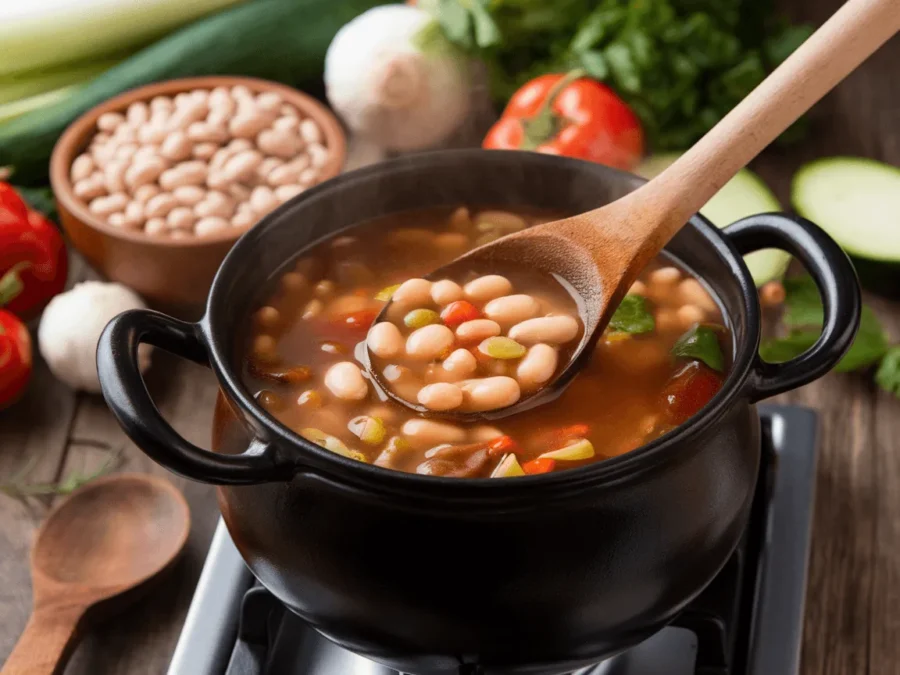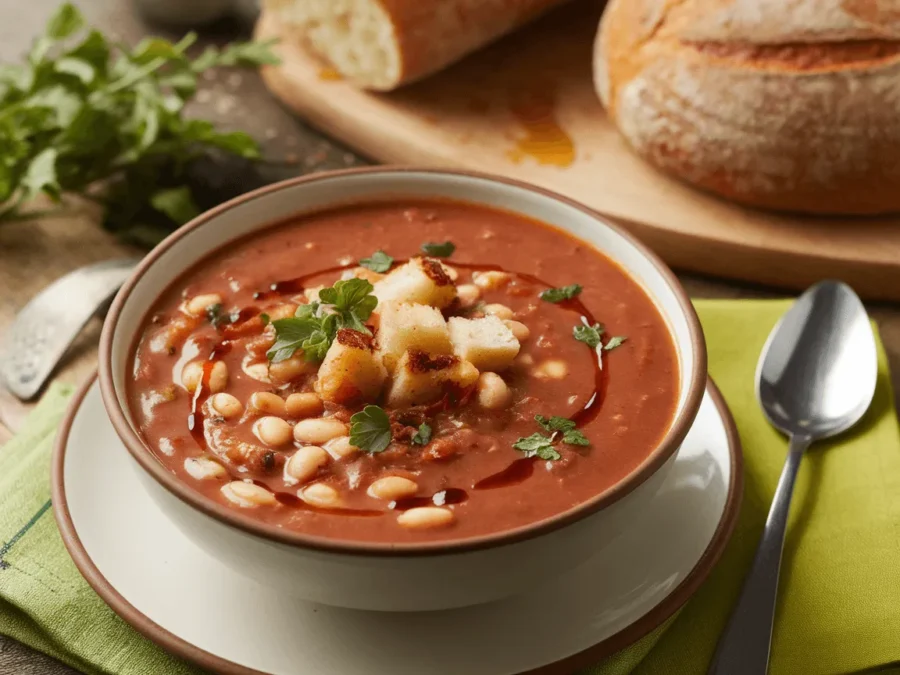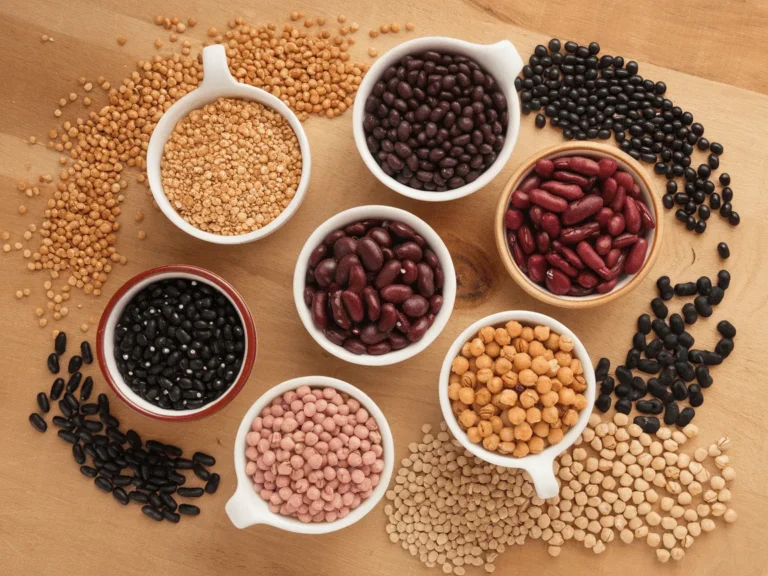Beans are a fantastic ingredient in soups, adding texture, protein, and heartiness to any recipe. But one question often comes up for home cooks: “Can I put uncooked beans in soup?” At first glance, it seems like a simple way to save time just toss them into the pot and let everything cook together. But is that really the best approach? Let’s dive into this culinary conundrum and uncover the truth about using uncooked beans in soup.
Table of Contents
Understanding the Basics of Cooking Beans
Beans are small but mighty. They’re packed with nutrients, versatile, and delicious when prepared properly. Cooking beans isn’t just about softening them; it’s also about unlocking their flavors and making them digestible.
What Happens When You Use Uncooked Beans in Soup?
Uncooked beans might sound like a shortcut, but they bring their own set of challenges. For starters, raw beans have a tough outer shell that takes time to break down. When you add them directly to a soup without pre-cooking or pre-soaking, you risk:
- Uneven texture: Your beans might be hard in the middle while your veggies turn to mush.
- Extended cooking time: If the soup is ready but your beans aren’t, you’ll be left waiting or biting into an undercooked bean.
- Nutritional concerns: Some beans, like kidney beans, contain toxins in their raw state that need to be neutralized through proper cooking.
And let’s be honest no one wants a gritty surprise when they’re expecting a creamy, hearty bite!
Types of Beans Best Suited for Soups
While almost any bean can shine in soup, some are more forgiving when it comes to cooking times. Here are the usual suspects:
- Lentils: These are the MVPs of the bean world when it comes to soups. No soaking needed, and they cook quickly.
- Black beans: A flavorful option, but they benefit from a good soak or pre-cook.
- Chickpeas (Garbanzo beans): They’re hearty and nutty but take longer to cook, even when soaked.
- Kidney beans: Delicious in chili and minestrone, but raw ones need extra care due to toxins.
If you’re experimenting with uncooked beans in your soup, start with varieties that cook faster, like lentils or split peas.
The Science Behind Cooking Beans
Cooking beans is more than just a culinary process it’s a bit of kitchen chemistry.
Nutritional Impact of Uncooked Beans
Beans are nutritional powerhouses, loaded with protein, fiber, vitamins, and minerals. But if you don’t cook them properly, you might miss out on these benefits. Cooking breaks down anti-nutrients, like lectins, that can interfere with your body’s ability to absorb all those good things.
“Beans are like locked treasure chests cooking is the key that unlocks their full potential!”
Digestive Issues Linked to Raw Beans
Ever had an upset stomach after eating beans? That’s because raw beans contain compounds that can cause bloating, gas, or even more serious digestive issues. The main culprits are lectins and oligosaccharides. While these are harmless once cooked, consuming beans raw or undercooked can lead to discomfort or worse.
And let’s not forget kidney beans. These beauties might look innocent, but raw or partially cooked kidney beans contain a toxin called phytohaemagglutinin that can cause severe nausea and vomiting. Cooking them thoroughly is non-negotiable.
Common Problems When Adding Uncooked Beans to Soup
Cooking beans directly in soup isn’t without its hurdles. If you’ve tried it before, you might have run into these issues:
Undercooking and Texture Issues
Beans cook at their own pace, and sometimes it’s slower than the rest of your soup ingredients. While your beans are still firm, your veggies might be overdone, leading to a soup that feels unbalanced.
Time Management Challenges with Uncooked Beans
Let’s face it life is busy, and soup is supposed to be a convenient, one-pot meal. But throwing uncooked beans into the mix often means adding an extra hour (or more) to your cooking time.
Impact on Soup Flavor
Uncooked beans can leech starch into the broth, creating a cloudy, gummy texture. On top of that, they might not absorb the flavors of your soup as well as pre-cooked or soaked beans, leaving your dish tasting flat.
“A soup is like a symphony all the ingredients need to play in harmony. Uncooked beans can sound a bit out of tune.”
Solutions for Using Uncooked Beans in Soup

But don’t despair! If you want to make soup with uncooked beans, there are ways to make it work.
Pre-Soaking Beans: Is It Necessary?
The short answer? Yes, if you want to save time and ensure even cooking. Pre-soaking beans softens their outer shell, reducing cooking time and improving texture. You can soak them overnight (the traditional method) or try a quick-soak method by boiling them briefly and letting them sit for an hour.
Soaking also has the added bonus of reducing some of the compounds that cause digestive discomfort.
Pressure Cooking vs. Slow Cooking Beans
If soaking isn’t your style, a pressure cooker can be your best friend. It speeds up the cooking process dramatically, making it easy to cook beans straight in your soup.
On the other hand, a slow cooker can work wonders if you’re okay with a hands-off approach. Just toss your uncooked beans into the pot with plenty of liquid and let them simmer all day.
Quick Fixes for Last-Minute Soup Preparation
Didn’t plan ahead? No problem! Keep canned beans in your pantry for a quick, no-soak solution. Rinse them thoroughly to remove excess sodium and toss them into your soup. While not technically uncooked, canned beans are a lifesaver when you’re in a pinch.
Popular Recipes Incorporating Beans in Soup
Cooking soup with beans doesn’t have to be intimidating. With the right recipe, you can create something hearty and satisfying every time.
Classic Minestrone Soup with Uncooked Beans
Minestrone is a hearty Italian soup loaded with veggies, pasta, and beans. Start with soaked kidney beans or cannellini beans, simmer them with tomatoes, carrots, celery, and spices, and finish with a drizzle of olive oil.
Hearty Bean and Vegetable Stew
This one-pot wonder is perfect for a cozy night in. Use navy beans or chickpeas for a nutty flavor and add plenty of root vegetables, like sweet potatoes and parsnips.
Spicy Black Bean Soup with a Twist
For something bold, try black beans with smoky chipotle peppers and lime juice. Serve with a dollop of sour cream or sprinkle of cilantro for extra flair.
Want me to continue writing the remaining parts? Let me know! 🌟
Tips for Enhancing Soups with Beans
Adding beans to soups can transform a simple broth into a hearty, flavorful meal. But how do you make the most of this humble ingredient? With the right techniques and a little creativity, beans can become the star of your soup recipes.
Balancing Spices and Herbs with Beans
Beans have a mild, earthy flavor, which makes them the perfect canvas for bold spices and aromatic herbs. Here are a few combinations to try:
- Cumin and coriander: Great for black bean soups or chili, these spices add warmth and depth.
- Bay leaves and thyme: Perfect for hearty bean and vegetable stews. Add them early in the cooking process to infuse your soup with subtle, herbaceous notes.
- Paprika and garlic: Smoked paprika paired with garlic works wonders in lentil or chickpea soups.
Pro tip: Always taste your soup as you go! Beans absorb flavors slowly, so adjusting your seasonings midway ensures everything stays balanced.
Using Broth to Improve Bean Flavor
Beans love to soak up liquid, so why not make that liquid as flavorful as possible? Skip plain water and opt for a rich vegetable, chicken, or beef broth instead. For an extra boost, try adding a splash of wine or a spoonful of tomato paste to the pot.
A trick to keep in your back pocket: if your broth tastes flat after cooking, a dash of acid like lemon juice or vinegar can brighten the flavors and bring your soup to life.
Health Benefits of Cooking Beans Properly in Soup

Beans are more than just a budget-friendly ingredient they’re a nutritional powerhouse that can make your soups both delicious and wholesome. Cooking beans properly ensures you get the most out of their health benefits while avoiding any potential risks.
Packed with Protein and Fiber
Beans are one of the best plant-based protein sources, making them ideal for soups, especially in vegetarian or vegan diets. Protein helps repair tissues and keeps you full for longer, while the high fiber content supports digestion and heart health.
For example, a cup of cooked black beans provides around 15 grams of protein and 15 grams of fiber. Imagine how satisfying a bean-filled soup can be for lunch or dinner!
“Beans don’t just fill your bowl they fuel your body.”
Rich in Vitamins and Minerals
Cooking beans correctly unlocks a treasure trove of essential nutrients, including:
- Iron: Supports oxygen transport in the blood, helping you stay energized.
- Magnesium: Important for muscle function and bone health.
- Potassium: Helps regulate blood pressure and maintain electrolyte balance.
- B Vitamins: Essential for energy metabolism and overall health.
Beans like lentils and chickpeas are especially high in folate, a B vitamin crucial for cell growth and development.
Lowering Cholesterol and Improving Heart Health
Including beans in soups is a heart-healthy choice. Their soluble fiber content helps reduce LDL (bad) cholesterol, while their potassium levels can help control blood pressure. Studies even suggest that regular consumption of beans reduces the risk of heart disease.
Plus, soups made with beans are naturally low in saturated fat, making them a guilt-free comfort food.
Common Myths About Cooking Beans in Soup
There’s a lot of folklore surrounding beans, and some of it can leave you second-guessing your cooking methods. Let’s bust a few myths:
Myth 1: Salt Prevents Beans from Softening
Many people believe that adding salt to beans before they’re cooked will keep them hard. In reality, a little salt can actually help break down the bean’s skin and enhance its flavor. The key is to add salt in moderation during cooking.
Myth 2: All Beans Need to Be Soaked Overnight
While soaking beans can save time, it’s not a hard-and-fast rule. Small beans like lentils or split peas don’t require soaking, and even larger beans can be cooked without it if you have extra time. Pressure cookers can also make soaking unnecessary.
Myth 3: Beans Should Be Boiled the Entire Time
Boiling beans too aggressively can damage their texture, causing them to break apart or turn mushy. A gentle simmer is all you need to cook beans properly while maintaining their shape and texture.
Troubleshooting Soup with Uncooked Beans
Even seasoned cooks can run into issues when adding uncooked beans to soup. Here’s how to tackle common problems:
Beans Are Still Hard After Cooking
If your beans remain stubbornly firm, it could be due to:
- Old beans: Dried beans lose their ability to soften as they age. Always use fresh beans.
- Hard water: Minerals in hard water can interfere with the cooking process. Adding a pinch of baking soda can help.
- Low heat: Beans need consistent heat to cook through. Ensure your soup stays at a steady simmer.
Soup Turned Too Thick or Gummy
When beans cook, they release starches that can thicken your soup. If it gets too thick:
- Add more broth or water to thin it out.
- Stir less often to prevent breaking up the beans.
- Use a spoon to scoop out some starch-heavy beans and purée only a portion for a creamy consistency.
Flavor Didn’t Absorb into the Beans
Beans are like sponges they soak up whatever they’re cooked in. If they lack flavor:
- Cook them in a well-seasoned broth or stock.
- Add acidic ingredients (like tomatoes or vinegar) only after the beans are tender, as acids can slow down cooking and block flavor absorption.
Environmental and Economic Benefits of Cooking with Beans
Beans aren’t just good for you they’re good for the planet and your wallet, too!
Sustainable Food Choice
Beans are a low-impact crop that requires fewer resources to grow compared to meat or dairy. They enrich the soil with nitrogen, reducing the need for chemical fertilizers. Choosing beans as a soup ingredient supports environmentally friendly eating.
Affordable and Accessible
Beans are one of the most cost-effective protein sources available. A bag of dried beans can provide multiple meals for just a few dollars. For budget-conscious cooks, they’re a pantry staple that can stretch soups and stews to feed the whole family.
Reducing Food Waste
Cooking soup with beans encourages the use of leftover vegetables, herbs, and broth. This not only minimizes waste but also creates a hearty, nutritious meal from what might otherwise be discarded.
Creative Garnishes to Elevate Your Bean Soups
Don’t stop at just the soup make it shine with creative toppings and garnishes!
Crunchy Toppings
- Croutons: Add texture with homemade croutons seasoned with garlic and herbs.
- Toasted nuts or seeds: Sunflower seeds or chopped almonds can provide a nutty crunch.
- Crispy bacon or pancetta: For non-vegetarians, a sprinkle of crispy pork can add a smoky note.
Fresh Finishes
- Herbs: Top with fresh parsley, cilantro, or chives for a burst of color and flavor.
- Citrus zest: Grate some lemon or lime zest to brighten the soup.
- Cheese: A sprinkle of Parmesan or a dollop of sour cream adds richness.
Fun Accents
- Chili oil: A drizzle of spicy chili oil can add heat and visual appeal.
- Pickled vegetables: Add tangy contrast with pickled onions or jalapeños.
- Edible flowers: If you’re feeling fancy, garnish with a few edible flowers for a gourmet touch.
“A great garnish isn’t just the cherry on top it’s the exclamation point of your soup!”
FAQs About Cooking Beans for Soup
When it comes to cooking beans, questions abound. Let’s address some of the most common concerns:
Can I Skip Pre-Soaking Beans Altogether?
Yes, you can skip pre-soaking beans, but be prepared for longer cooking times. Unsoaked beans might take anywhere from 1.5 to 3 hours to cook fully, depending on their type and age. However, pre-soaking helps soften beans and reduce cooking time, so it’s a step worth considering.
If you’re short on time and skip the soak, keep a close eye on your soup’s liquid level. Unsoaked beans absorb more water during cooking, and you don’t want a dry pot!
How Long Do Uncooked Beans Take to Cook in Soup?
The cooking time for uncooked beans varies depending on the type of bean and your method. Generally:
- Stovetop simmering: 1.5 to 3 hours.
- Slow cooker: 6 to 8 hours on low, 3 to 5 hours on high.
- Pressure cooker: 25 to 40 minutes, depending on the bean.
Are There Any Beans That Shouldn’t Be Used in Soups?
Most beans are soup-friendly, but a few require extra care:
- Red kidney beans: These must be boiled for at least 10 minutes before adding to soup to neutralize their toxin, phytohaemagglutinin.
- Old or stale beans: They might never soften properly, no matter how long you cook them. Always check expiration dates before using dried beans.
What’s the Best Way to Store Leftover Bean Soup?
Store your soup in an airtight container in the fridge for up to 3–4 days. For longer storage, freeze it in portion-sized containers. Keep in mind that beans continue to absorb liquid over time, so you may need to add a splash of broth or water when reheating.
Final Thoughts: Embracing the Art of Bean Soups
Whether you’re an experienced cook or a soup newbie, working with uncooked beans can be a rewarding journey. By understanding the nuances of bean cooking, experimenting with spices and flavors, and tackling common challenges, you’ll be able to create soups that are as comforting as they are nutritious.
So, the next time you ask, “Can I put uncooked beans in soup?” the answer is a resounding yes with a little patience, care, and creativity. Enjoy the process, and happy soup-making! 🥣

